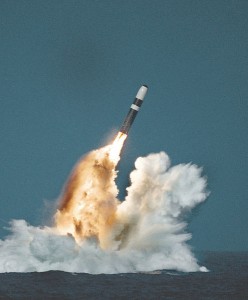 Congress has returned to Washington after a hiatus. On their to-do list for the lame duck session are several high priority items, including coming up with a deal to avoid the automatic, across-the-board budget cuts that will go into effect January 2nd, per the Budget Control Act that Congress passed last August.
Congress has returned to Washington after a hiatus. On their to-do list for the lame duck session are several high priority items, including coming up with a deal to avoid the automatic, across-the-board budget cuts that will go into effect January 2nd, per the Budget Control Act that Congress passed last August.
The difficulty is that no one wants to make the tough choices necessary for a comprehensive budget deal. Revenue increases, entitlement reform, cutting government spending—all of these options threaten influential stakeholders.
There’s one thing that all policymakers should be able to agree on: bringing the U.S. nuclear force in line with today’s security threats by eliminating unnecessary nuclear programs.
Trimming excess nuclear capabilities is a strategic move. The U.S. nuclear stockpile numbers over 5,000 weapons, including about 1,950 strategic warheads deployed on close to 800 delivery vehicles.
In a post-Cold War world of security threats like climate change and cyberattacks, a massive nuclear arsenal seems strangely out of place. As the Washington Post’s Walter Pincus writes, “The U.S. stockpile does not deter terrorists, nor Iran in its quest for a weapon.”
The outsized U.S. nuclear arsenal is more than just anachronistic. Maintaining excess nuclear capabilities puts U.S. national security at risk by diverting billions of dollars from more important defense capabilities.
In 2012, the U.S. spent about $31 billion on strategic offensive nuclear forces. Ambitious (and expensive) modernization programs mean the U.S. is on track to spend $640 billion on nuclear weapons and related programs over the next ten years.
Many national security leaders support eliminating unnecessary nuclear programs. General James Cartwright (ret.), who oversaw the nation’s nuclear forces as the head of U.S. Strategic Command, chaired an expert commission that called for downsizing the arsenal and eliminating land-based missiles. Senator Tom Coburn (R-OK) recommended reducing the fleet of nuclear-armed submarines and delaying the purchase of new nuclear bomber as part of a deficit reduction plan.
Lt. Gen. Dirk Jameson (ret.), former deputy commander in chief and chief of staff of the U.S. Strategic Command, recently called for a new approach to nuclear strategy, arguing that “Having more weapons doesn’t mean we are ‘winning’…it merely reflects that our nuclear strategy is ill-suited to our times.”
The outdated nuclear strategy impacts the broader U.S. national security strategy by diverting resources from other programs. As then-Secretary of State Colin Powell once noted, “[Nuclear weapons] are expensive. They take away from soldier pay…They take away from lots of things. There is no incentive to keep more than you believe you need for the security of the nation.”
Eliminating unnecessary nuclear programs will save billions of dollars that can be invested in defense capabilities that more effectively address 21st century security threats.
Lawmakers have a chance to change the trajectory of the U.S. nuclear strategy as they debate budget options during the lame duck session.
So welcome back to Washington, Congress! Now what are you going to do about the out-of-control nuclear budget?


